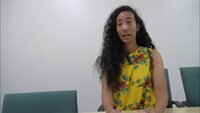| Title |
Cairo, Jessica OH19_078 |
| Creator |
Weber State University, Stewart Library: Oral History Program. |
| Contributors |
Cairo, Jessica, Interviewee; Rands, Nute, Interviewer; Baird, Raegan, Video Technician |
| Description |
The Beyond Suffrage Project was initiated to examine the impact women have had on northern Utah. Weber State University explored and documented women past and present who have influenced the history of the community, the development of education, and are bringing the area forward for the next generation. The project looked at how the 19th Amendment gave women a voice and representation, and was the catalyst for the way women became involved in the progress of the local area. The project examines the 50 years (1870-1920) before the amendment, the decades to follow and how women are making history today. |
| Abstract |
The following is an oral history interview with Jessica Cairo, conducted on August 5, 2019, in the Stewart Library, by Nute Rands. In this interview, Jessica discusses her life, her memories, and the impact of the 19th Amendment. Raegan Baird, the video technician, and Brooklyn Knight, are also present during this interview.; The following is a video clip of an oral history interview with Jessica Cairo, conducted on August 5, 2019. In this video clip, Jessica discusses the differences between her life and her mother and grandmother's lives. |
| Image Captions |
Jessica Cairo 5 August 2019; Jessica Cairo discussing the differences between her life and her mother's and grandmother's lives. |
| Subject |
Women--suffrage; Voting--United States; Women college; Women--Rights of women |
| Keywords |
Voting rights; Gender equality; 19th Amendment |
| Digital Publisher |
Stewart Library, Weber State University, Ogden, Utah, United States of America |
| Date |
2019 |
| Date Digital |
2019 |
| Temporal Coverage |
1992; 1993; 1994; 1995; 1996; 1997; 1998; 1999; 2000; 2001; 2002; 2003; 2004; 2005; 2006; 2007; 2008; 2009; 2010; 2011; 2012; 2013; 2014; 2015; 2016; 2017; 2018; 2019 |
| Medium |
oral histories (literary genre) |
| Spatial Coverage |
Panama City, Bay, Florida, United States, https://sws.geonames.org/4167694, 30.15946, -85.65983; Federal Republic of Germany, Germany, https://sws.geonames.org/2921044, 51.5, 10.5; Ogden, Weber, Utah, United States, https://sws.geonames.org/5779206, 41.223, -111.97383 |
| Type |
Text; Image/StillImage; Image/MovingImage |
| Access Extent |
29 page PDF; Video clip is an mp4 file, 69.8 MB |
| Conversion Specifications |
Filmed using a Sony HDR-CX430V digital video camera. Sound was recorded with a Sony ECM-AW3(T) bluetooth microphone. Transcribed using Express Scribe Transcription Software Pro 6.10 Copyright NCH Software. |
| Language |
eng |
| Rights |
Materials may be used for non-profit and educational purposes, please credit University Archives; Weber State University; Music from Uppbeat (free for Creators!): https://uppbeat.io/t/yeti-music/gentle-breeze; License code: IWGKRYG7XHQOMZY0; Music from Uppbeat (free for Creators!): https://uppbeat.io/t/simon-folwar/hope; License code: KYI5VLB63GF1TXND |
| Source |
Cairo, Jessica OH19_078 Weber State University Archives |
| Format |
application/pdf; video/mp4 |
| ARK |
ark:/87278/s6574y16 |
| Setname |
wsu_bs_oh |
| ID |
105486 |
| Reference URL |
https://digital.weber.edu/ark:/87278/s6574y16 |
| Title |
Cairo, Jessica OH19_078 |
| Creator |
Weber State University, Stewart Library: Oral History Program. |
| Contributors |
Cairo, Jessica, Interviewee; Rands, Nute, Interviewer; Baird, Raegan, Video Technician |
| Description |
The Beyond Suffrage Project was initiated to examine the impact women have had on northern Utah. Weber State University explored and documented women past and present who have influenced the history of the community, the development of education, and are bringing the area forward for the next generation. The project looked at how the 19th Amendment gave women a voice and representation, and was the catalyst for the way women became involved in the progress of the local area. The project examines the 50 years (1870-1920) before the amendment, the decades to follow and how women are making history today. |
| Abstract |
The following is an oral history interview with Jessica Cairo, conducted on August 5, 2019, in the Stewart Library, by Nute Rands. In this interview, Jessica discusses her life, her memories, and the impact of the 19th Amendment. Raegan Baird, the video technician, and Brooklyn Knight, are also present during this interview. |
| Image Captions |
Jessica Cairo 5 August 2019 |
| Subject |
Women--suffrage; Voting--United States; Women college; Women--Rights of women |
| Keywords |
Voting rights; Gender equality; 19th Amendment |
| Digital Publisher |
Stewart Library, Weber State University, Ogden, Utah, United States of America |
| Date Digital |
2019 |
| Temporal Coverage |
1992; 1993; 1994; 1995; 1996; 1997; 1998; 1999; 2000; 2001; 2002; 2003; 2004; 2005; 2006; 2007; 2008; 2009; 2010; 2011; 2012; 2013; 2014; 2015; 2016; 2017; 2018; 2019 |
| Medium |
oral histories (literary genre) |
| Spatial Coverage |
Panama City, Bay, Florida, United States, https://sws.geonames.org/4167694, 30.15946, -85.65983; Federal Republic of Germany, Germany, https://sws.geonames.org/2921044, 51.5, 10.5; Ogden, Weber, Utah, United States, https://sws.geonames.org/5779206, 41.223, -111.97383 |
| Type |
Text; Image/StillImage |
| Access Extent |
29 page PDF |
| Language |
eng |
| Rights |
Materials may be used for non-profit and educational purposes, please credit University Archives; Weber State University |
| Source |
Cairo, Jessica OH19_078 Weber State University Archives |
| Format |
application/pdf |
| Setname |
wsu_bs_oh |
| ID |
105661 |
| Reference URL |
https://digital.weber.edu/ark:/87278/s6574y16/105661 |





